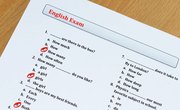A noun is the most common type of word found in the English language. It is used to describe a person, place, thing, idea or animal. A noun can be also be used to show possession of an object. Like many words in the English language, a noun can be regular or irregular. When it comes to an irregular possessive noun, putting all of the English rules of grammar together to ensure you are correct can be a challenge. Understanding the difference between possessive nouns and irregular nouns will help solve the mystery of irregular possessive nouns.
Irregular Nouns
An irregular noun is a noun that does not follow the basic rules of pluralization. For most nouns, you simply add an s at the end of the word to make it plural. For example, girl becomes girls. For irregular nouns, you have to take an additional step to alter the spelling of the noun to make it plural. For example, child becomes children and goose becomes geese. These irregular nouns do not follow any particular rules of grammar, so the changes must simply be memorized.
Possessive Nouns
A possessive noun is used to show ownership of a particular object. To make a noun possessive, typically you would add an apostrophe and an s. For example, if a book belonged to a particular girl, you could say it was that girl's book. This rule can be a little tricky when the noun already ends in an s. In that situation, you would still add an apostrophe and an s after the last letter in the word. For example, if a dress had buttons, you could say that it was the dress's buttons.
Possessive Plural Nouns
A possessive plural noun is defined as a plural noun that is used to show ownership of a particular object. As with a singular possessive noun, the possessive noun will come before the object it owns. The difference is that you would only add an apostrophe at the end of the word, and there would be no need to add an extra s. For example, if cheerleaders practiced a certain routine, you would say it was the cheerleaders' routine.
Irregular Possessive Nouns
An irregular possessive noun refers to an irregular plural noun used to show possession. With irregular possessive nouns, add an apostrophe and an s at the end of the word to make it possessive. For example, the plural of woman is women. The plural possessive of woman is women's. Because woman is an irregular noun, you need to determine how to correctly make it plural and then make it possessive based on the rules of possession. This gets slightly more complicated when the irregular noun ends in s in its plural form. These nouns would follow the same rule as any plural noun that ends in s, but you would only add an apostrophe to the end of the word. For example, the plural of knife is knives. The possessive form of knives is knives'.
Related Articles
References
Writer Bio
Kelly Whiteford has been writing professionally since 2005, when she first began writing research papers on renewable energy and energy efficiency. She now writes for eHow. Whiteford holds a Bachelor of Arts in marketing from Towson University.











